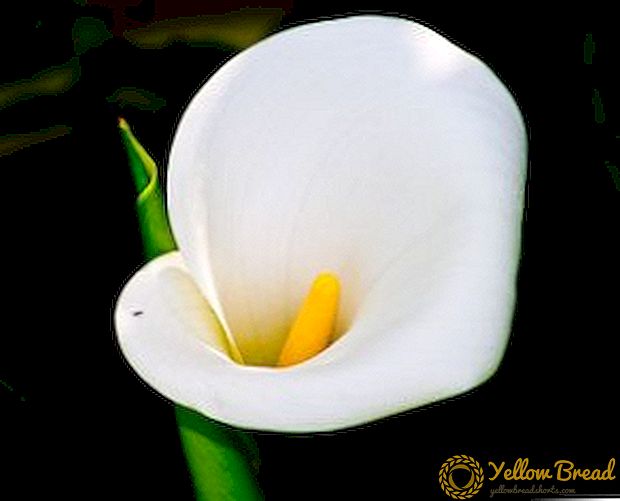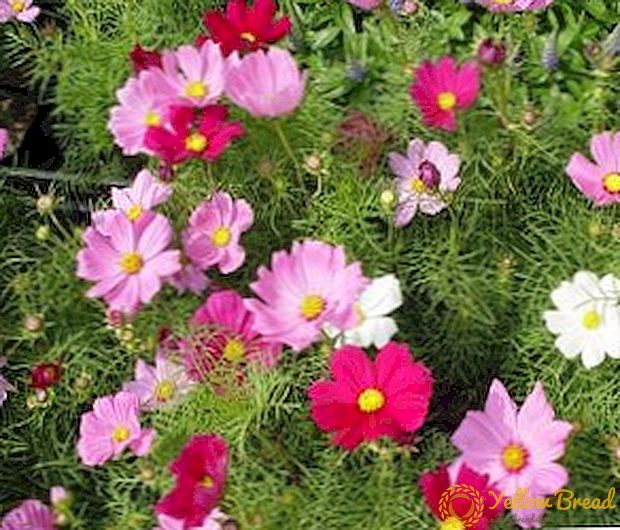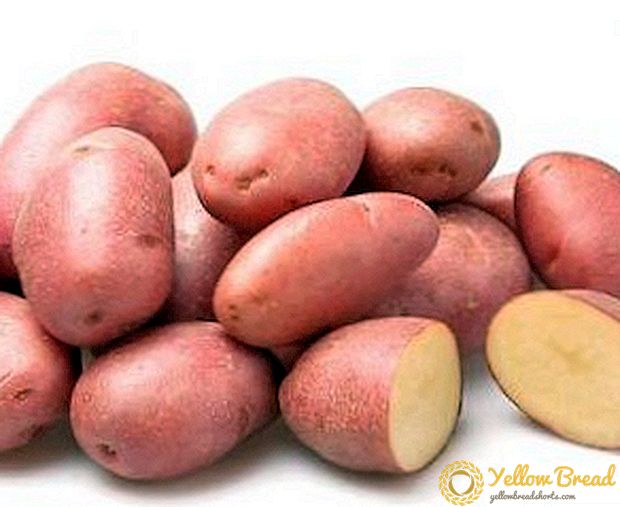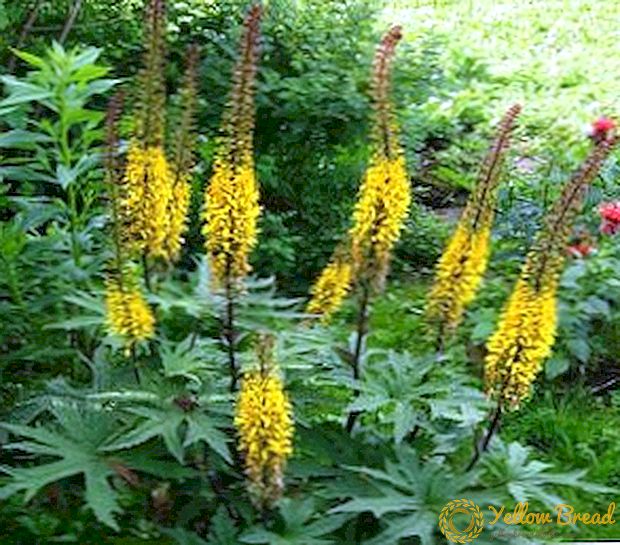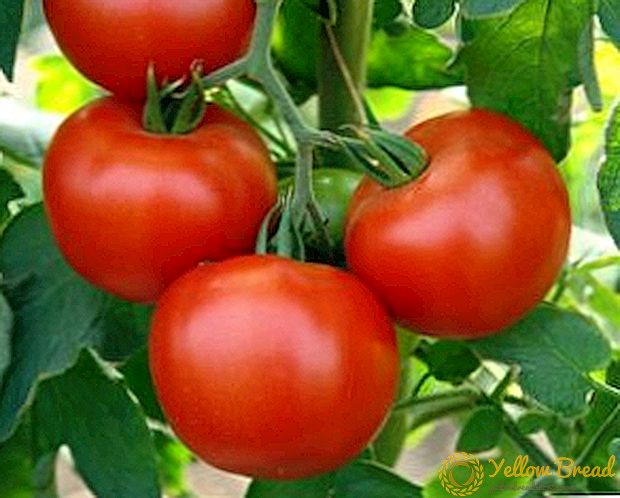 Even in the harsh Siberian climate, you can grow a juicy, ripe tomato, filled with the taste of summer.
Even in the harsh Siberian climate, you can grow a juicy, ripe tomato, filled with the taste of summer.
And not even one, because this variety gives high yields and for good reason included in the State Register of Varieties of the Russian Federation.
In this article we will consider all the necessary information about the cultivation of this unique vegetable.
- Appearance and description of the variety
- Characteristics of the fruit
- The advantages and disadvantages of the variety
- Agrotechnology
- Seed preparation, planting seeds and care for them
- Seedlings and planting in the ground
- Care and watering
- Pests and diseases
- Conditions for maximum fruiting
- Use of fruits
Appearance and description of the variety
It is enough to study the forums of gardeners and gardeners to come to the conclusion - the tomato "Three" like everyone. This is not surprising, given the characteristics and description of the variety: heavy juicy fruits, rich harvest, unpretentiousness and resistance to disease. Tomato bush grows to 60 cm and refers to the standard. Simply put, it is a bush on the leg. This form of the plant allows it to occupy less space, which is especially important on the notorious "six hundred square meters."
Characteristics of the fruit
Tomatoes have a pronounced sweetish taste, ideal for salads and appetizers. The shape of the fruit is elongated and reaches 15 cm.Sometimes its appearance is vaguely reminiscent of red pepper. Pulp is dense, or, as fans say fondly of tomatoes, "meaty." The weight of one tomato reaches 300 g. 
The advantages and disadvantages of the variety
The undoubted advantages of a vegetable include its simplicity. Even a beginner gardener can cope with plant care. Tomato "Siberian triple", as already mentioned in the description of the variety, grows compact and saves you useful space. If this factor is not so important, then there is another advantage - the standard bushes look very beautiful and will decorate your site.
After 4-6 brushes with fruits form on the bush, the Siberian triple will stop growing. Thus, there is no need to control the ripening process, fearing that the bush will grow to the detriment of the quality of the fruit.
Tying up a plant is possible, but not an obligatory agrotechnical method. You will not need pasynkovanie or other tricks of the tomato farm.Moreover, the variety of tomatoes "Troika" grows in any type of soil and at the same time yields 200-350 centners per hectare. 
Agrotechnology
The task of every gardener is to grow a good harvest with minimal labor and resources. But even such an unpretentious variety of tomatoes, like the Siberian Troika, requires certain knowledge and proper planting and care. The agrotechnical techniques include all the necessary steps, starting with the preparation of planting material and ending with harvesting.
Seed preparation, planting seeds and care for them
The very first stage in the preparation of seeds is their culling. That is, the selection of the most promising samples. For this, 1 tsp. salts are diluted in a glass of water, seeds are placed in this solution and stirred for several minutes.Then you need to wait 10 minutes and observe the result. Empty seeds will float, and large and full-bodied will settle to the bottom. They need to be washed and dried, this is the basis of the future harvest.  If the seeds of tomatoes were stored in the cold, they should be heated for a month and a half before planting. The procedure itself will take about a week, since warming is recommended to be done gradually, raising the temperature from +18 ° C to +80 ° C. The seeds are placed in fabric bags and heated on the battery for several days.
If the seeds of tomatoes were stored in the cold, they should be heated for a month and a half before planting. The procedure itself will take about a week, since warming is recommended to be done gradually, raising the temperature from +18 ° C to +80 ° C. The seeds are placed in fabric bags and heated on the battery for several days.
Towards the middle of April, the ground is harvested. It will be better to ignite it a little in the oven, especially if it is a primer from your summer house, and not specially purchased.
It is advisable to germinate seeds before sowing. To do this, moisten a paper napkin with water and put it on a dish. Then on a napkin spread the seeds of tomatoes, covering them with a free end, and put a plate with all the contents into a bag. In a warm place for three days sprouts will appear, the main thing is not to forget to moisten the napkin as it dries.
Seeds of tomatoes are planted in containers, best of all if they are special plastic boxes with a tray. They are easy to disinfect and carry if necessary.Each container must have openings for excess moisture. Before planting, the soil and seeds are treated with a solution of 1% potassium permanganate to avoid the appearance of unwanted microorganisms.  After the soil and seeds are prepared, proceed to planting. First, a drainage layer is laid at the bottom of the drawers - small pebbles or crushed eggshell. Secondly, it is necessary to fill the soil and immediately pour it with warm water. Then our germinated seeds are laid down to a depth of no more than 2 cm. If you are still inexperienced in gardening, first make a hole in the ground to the desired depth, and then safely lower the seed into it. Now it remains only to cover the containers with a film and put in a warm place.
After the soil and seeds are prepared, proceed to planting. First, a drainage layer is laid at the bottom of the drawers - small pebbles or crushed eggshell. Secondly, it is necessary to fill the soil and immediately pour it with warm water. Then our germinated seeds are laid down to a depth of no more than 2 cm. If you are still inexperienced in gardening, first make a hole in the ground to the desired depth, and then safely lower the seed into it. Now it remains only to cover the containers with a film and put in a warm place.
If everything is done correctly, you will see the first shoots in a week. And this event will mean that our seedlings go to the sun: the containers are transferred to the window sill.
After the seedlings are a little stronger, they are subjected to a pick. With the help of a 10 cm long picket stick, the germs are lifted up and hooked, pulling out of the container along with an earthy ball. Sick and underdeveloped specimens are removed; in healthy individuals, the root is approximately one-third clamped with the nail.
Now the sprouts will live in separate, more spacious pots.For them, in the new place in the soil, a fossa is made all the same with a picket, spacious enough not to damage the root during planting. After completion of the procedure, finger gently pressed the ground to the roots, plentifully watered. If the soil subsides, it is necessary to fill it. The last stage is the transfer of seedlings to a semi-dark place.
Seedlings and planting in the ground
Seedlings can be transferred to the beds at the end of May. If the spring chill dragged on, then the landing period is postponed to the beginning of June. Strong sprouts, ready for planting, have at least nine leaves, while their height is not less than 24 cm.
When preparing the site, it is worth considering that tomatoes love heat and sunlight, so it is better to plant them in the open. If possible, then under the white wall of the house there will be an ideal place - the light reflected from the wall will fall on the vegetables again.
Planting of seedlings in the open ground is made after lunch. In the first half of the day, the seedlings are cooked: they water abundantly to make it easier to remove the sprouts. In the ground, dig holes in the size of the pot, they put humus or mineral fertilizer. After a careful planting, the seedlings are watered, and then the wells are sprinkled with dry earth.  Planting tomatoes most often in a checkerboard pattern. Between the rows there should be a distance of at least 70 cm, and between the bushes - about 50 cm.
Planting tomatoes most often in a checkerboard pattern. Between the rows there should be a distance of at least 70 cm, and between the bushes - about 50 cm.
Care and watering
Watering tomatoes "Siberian triple" is necessary when the topsoil begins to dry out, but always regularly. After watering, the ground needs to be loosened a little for the full access of oxygen to the sprouts.
Growing even such an unpretentious vegetable is not complete without fertilizers and mulching. Fertilizers are needed during the period of active growth of fruits, only 3-4 fertilizing. For this purpose liquid mixtures from bird droppings, mullein, potassium, phosphorus and zinc are suitable.
The water rate for each tomato bush in the first days after landing in the ground is 0.5 liters, by the end of the month - 1.5 liters.
The rest of the care of tomatoes does not differ from the standard care of the garden: periodically loosen the soil and weed. If we are talking about greenhouses, they need to be aired regularly.As mentioned above, pasynkovanie our tomatoes do not need.
Pests and diseases
High-quality weeding and here will serve you well and prevent various pests for a long time to stay at the precious crop. Spraying with insecticides is undesirable, but its use is allowed before the tomatoes ripen.
- Broth onion peel.
- Ammonia.
- Soap solution.
A glass of onion peel per liter of water insists day, after which they can spray tomatoes. If you add to the mixture finely planed soap, you get an effective remedy for aphids and ticks.
Soap solution is a piece of household soap, about 20 g, dissolved in a liter of water. It is better to spray bushes in the evening and do not water them anymore.
Ammonia in the amount of 50 ml dissolved in a bucket of water perfectly relieve plants from aphids.  A more pleasant way to control pests is to land next to a tomato bed of fragrant herbs. For example, celery or parsley.
A more pleasant way to control pests is to land next to a tomato bed of fragrant herbs. For example, celery or parsley.
Conditions for maximum fruiting
In order to have as many tomato seeds as possible the Siberian Troika sprout, you can soak them in a growth stimulator before planting. Modern agronomy looks positively at biostimulants, arguing that they not only accelerate growth, but also increase crop resistance to fungal diseases. To use them or not - you decide.
The process of soaking the seeds is performed only after they are disinfected with a solution of potassium permanganate or one of the modern preparations of bacterial action. The average procedure time is from 18 to 24 hours. Do not forget to carefully study the instructions for the selected drug, otherwise you risk burning the seeds. 
"Three" - mid-ripe tomato, as described in the registry. And, by stimulating the growth of sowing, you are achieving and the early ripening of fruits.
Use of fruits
"Troika" has a delicate and at the same time bright taste. Therefore, add it to a salad, appetizer or other dish at your discretion and enjoy the fruits of your work. You can eat a tomato without anything. The fact that it was you who yourself raised such a masterpiece will give any dish a unique taste.
Any heat treatment is possible with this variety of tomatoes. Dense structure makes it possible to perfectly preserve the fruits, they are strong and juicy. They also preserve tomato juices, all sorts of borsch oil dressing with the addition of tomatoes, and even jam.
Tomato variety "Siberian triple" - ideal for those who love tomatoes, but are not ready to fully immerse themselves in the world of truck farming. They do not have to be tied up, they do not get sick, they bear good fruit and even decorate the dacha. But they need minimal care, which should not be neglected.


